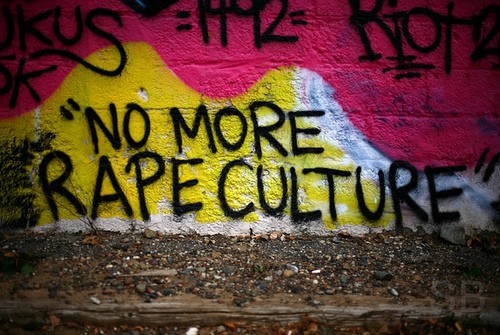
A male student at Dartmouth College recently published an online “rape guide” advising how a first-year female student, whom he named, could be persuaded to perform oral sex. She says she was subsequently sexually assaulted at a fraternity party.
Such high-profile incidents of campus sexual assault have prompted an explosive debate in the media and online: Does America have a “rape culture”? Time magazine recently featured a bright red and white pennant on its cover that read “RAPE” with the subheadline, “The Crisis in Higher Education.” The New York Times published an extensive Sunday front-page story focusing on the failure by Columbia University (and other institutions) to respond aggressively to student charges of rape by fellow students. The prestigious Peabody Awards, which honor distinguished achievement in electronic media, this year awarded an online video about sexual violence that went viral: the instantly famous “A Needed Response,” produced by University of Oregon students outraged by CNN’s sympathetic coverage of the Steubenville, Ohio, athletes convicted of raping a 16-year-old girl. And the feminist organization UltraViolet launched a Facebook ad campaign targeting high school students, asking, “Accepted to Dartmouth? You should know about its rape problem before you attend. Learn more now.”
All of this has led to controversy around the extent to which an acceptance of rape might be woven into the underlying weft and warp of our culture. Anti-feminist Christina Hoff Sommers, unsurprisingly, said the “rape-culture crusade is turning ugly” and, without citing any evidence, that the “list of falsely accused young men subject to kangaroo-court justice is growing.” But RAINN (Rape, Abuse and Incest National Network), the nation’s largest anti-sexual-violence organization, also repudiated the notion that rape is caused by cultural factors, issuing a set of recommendations urging the White House to remain focused on the true cause of the problem: “the conscious decisions, of a small percentage of the community, to commit a violent crime.”
And, in an op-ed piece for Time, Caroline Kitchens of the conservative American Enterprise Institute cast the term “rape culture” as “hysteria” and argued that to accept it is to “implicate all men in a social atrocity,” that most people regard rape as a horrific crime, and that rapists are “despised.”
Sadly, at many colleges and universities, men who sexually assault women are hardly despised. Rather, they sometimes brag about and are admired for their conquests. The blog Jezebel recently revealed 70 pages of emails from a secret fraternity at American University that included the line, “she’s a girl you need to f**k hard and rape in the woods,” and the assertion that rape is about “dumb bitches learning their place.”
The main criticism of the term “rape culture” seems to be that rape is a crime in our society, that it is recognized as such, and that when a rape occurs, the act is condemned. Of course, only certain rapes receive this treatment — that of a child, or that of a woman who is white, has not had a drop to drink, is not scantily clad and is assaulted by a total stranger. But more broadly, “culture” is not just about our explicit, proclaimed, and “official” values, but rather includes how we live every day, and the beliefs, attitudes, and practices that permeate our media, our institutions, our places of worship, where we work, and where we play.
So, when one in five undergraduate women is a victim of sexual assault while in college, when an estimated 26,000 soldiers were sexually assaulted in 2012 alone, when a hit show like HBO’s Game of Thrones incessantly depicts women getting raped, when video games like Metal Gear Solid V or Tomb Raider include actual or attempted sexual assaults (with many gamers saying “you just got raped!” to mean “you lost”), when some cops and judges continue to assume that a raped woman who had too much to drink was “asking for it,” when Daniel Tosh (and other comics) make jokes about a woman getting gang-raped, when a deranged 22-year-old kills six people, and then himself, out of a determination to “slaughter all of those evil, slutty bitches who rejected me,” then there is indeed a tolerance for this despicable crime embedded in our culture that we have yet to exterminate.
